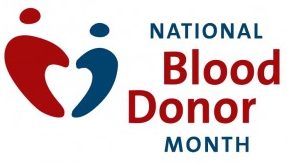January is Blood Donor Month and iff your New Year’s resolutions include doing more to help others, donating blood is a great way to accomplish it!
Carter BloodCare reached out to donors on Facebook and asked why they think it is important to give blood. They asked donors to answer the question in 20 words or less. The top 14 reasons are below:
- It saves lives — what else do you need to know?
- It is not more painful than losing a loved one that you may save by donating!
- It is your civic duty.
- Because I know too many people who can’t give blood.
- Because someday, I may need someone to do the same for me.
- Do unto others, as you would have them do unto you!
- Because if you need blood one day, you would not hesitate to take it, so why would you hesitate to give it?
- Blood donation is important because maintaining an adequate blood supply in our community secures blood transfusions for patients.
- Because I can.
- Nutter Butters.
- The question is, why not give blood?
- It gives donors a medical check at no cost.
- Free cookies, juice and the satisfaction of helping others.
- I can’t discover a cure for cancer, but I can help keep someone alive while they are waiting for a cure.
These facts about the need for blood help explain the importance of being a donor:
- Approximately 36,000 units of red blood cells are needed every day in the U.S.
- Nearly 7,000 units of platelets and 10,000 units of plasma are needed daily in the U.S.
- Nearly 21 million blood components are transfused each year in the U.S.
- The average red blood cell transfusion is approximately three units.
- The blood type most often requested by hospitals is type O.
- Sickle cell patients can require blood transfusions throughout their lives.
- Cancer patients receiving chemotherapy treatments require blood transfusions often, some even daily.
- A single car accident victim can require as many as 100 pints of blood.
- Each year, an estimated 6.8 million people in the U.S. donate blood.
- 6 million whole blood and red blood cells are collected in the U.S. in a year.
- About 45 percent of people in the U.S. have Group O (positive or negative) blood; the proportion is higher among Hispanics (57 percent) and African Americans (51 percent).
- Type O negative red cells can be given to patients of all blood types. Because only 7 percent of people in the U.S. are type O negative, it’s always in great demand and often in short supply.
- Type AB positive plasma can be transfused to patients of all blood types. Since only 3 percent of people in the U.S. have AB positive blood, this plasma is usually in short supply.
- Red blood cells must be used within 42 days (or less) and platelets must be used within just five days.
https://www.redcrossblood.org/Bottom of Form


